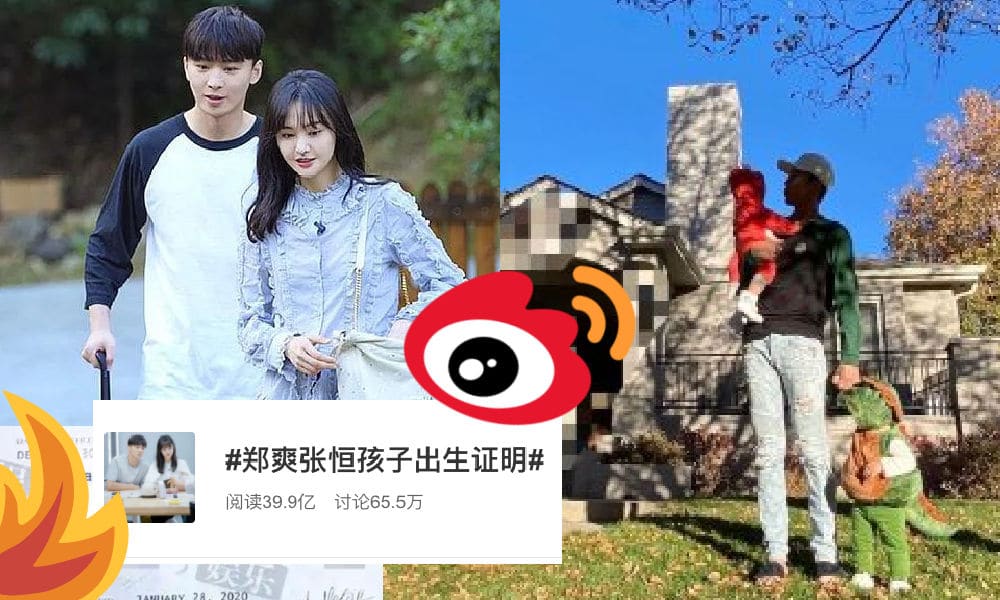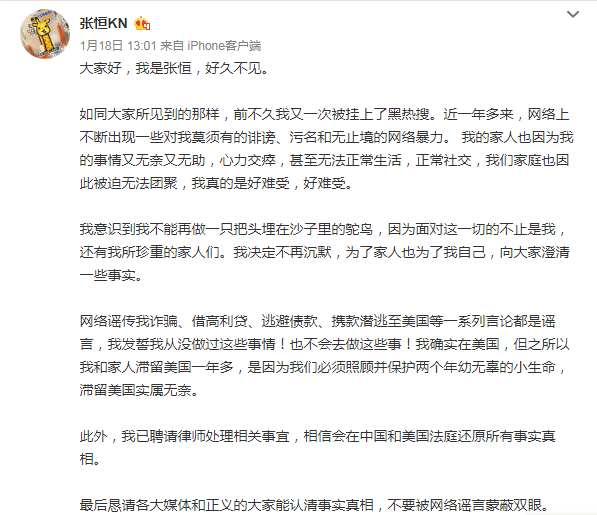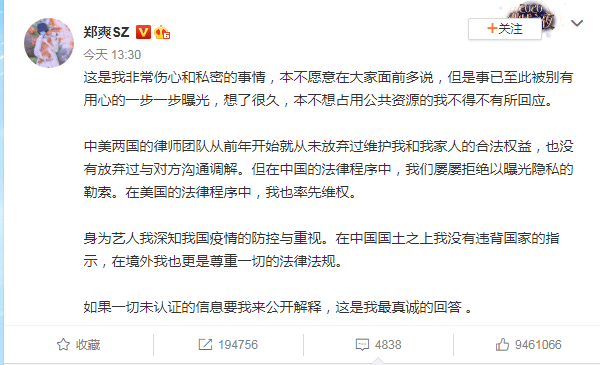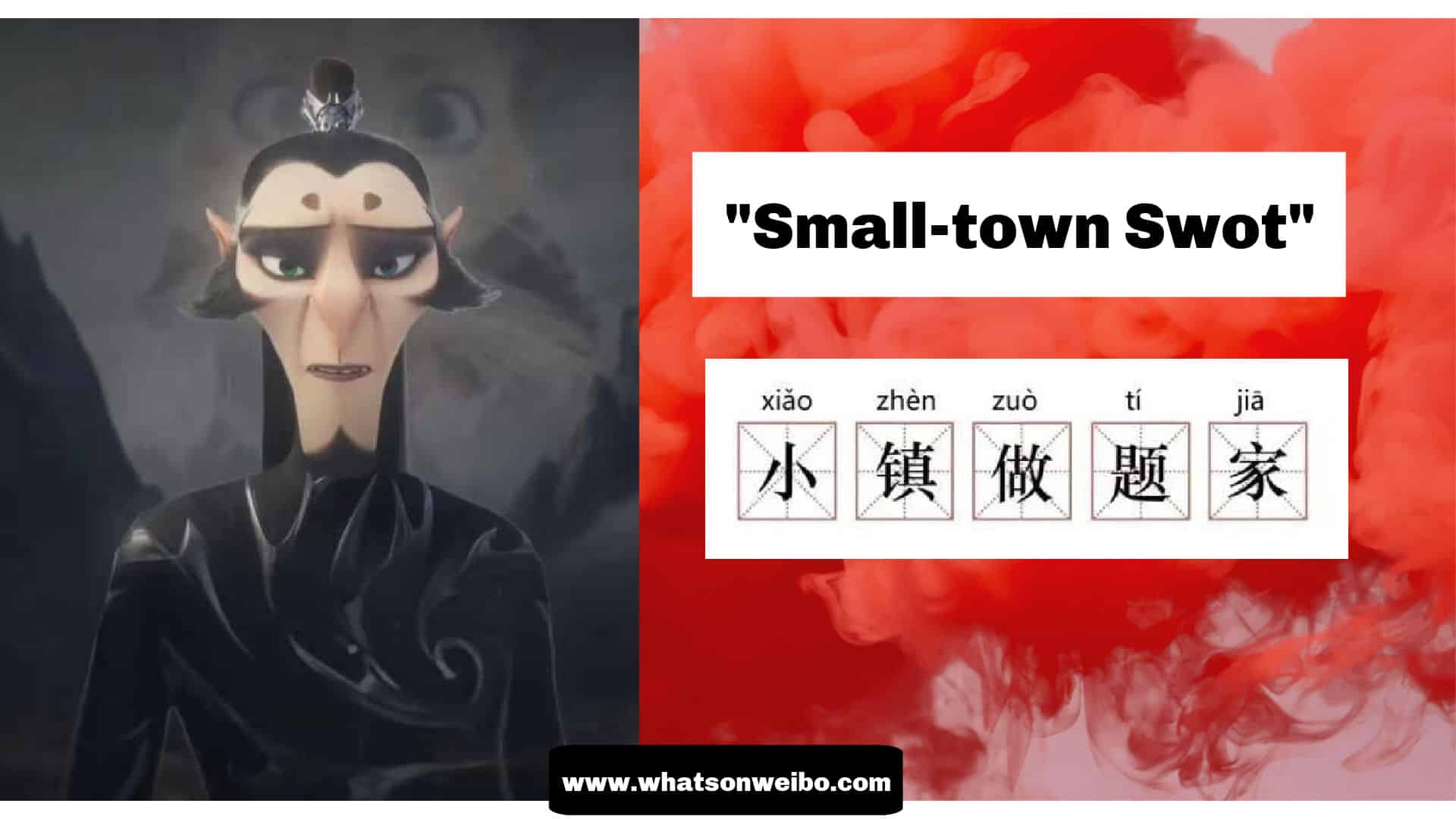China Arts & Entertainment
Zheng Shuang, Zhang Heng, and ‘Surrogacy Gate’: A Timeline
One celebrity couple breakup, two children born through surrogacy: this sad and messy topic has exploded on Chinese social media.
Published
4 years agoon

A celebrity surrogacy scandal is dominating discussions on Chinese social media, with one hashtag on the case attracting over 3 4 billion views. The scandal is triggering discussions on the topic of surrogacy in China.
Her name is Zheng Shuang (郑爽, 29), his name is Zhang Heng (张恒, 30). They’re both celebrities in China; she is a super famous actress, he is a well-known producer.
This week, it is not their work that made them go viral on Chinese social media, but a surrogacy scandal taking place in the United States that is dominating all trending lists on Weibo.

Zheng and Zhang in happier times.
The social media storm started on Monday, January 18, when rumors surfaced on Weibo and Wechat that the celebrity couple had separated. Some netizens had located a ‘dissolution’ case concerning the couple through the public access of the US federal court system.

Subsequently, news and rumors began circulating that the couple had two children in the US through a surrogacy arrangement, but that actress Zheng Shuang refused to have them because she and Zhang had broken up – even though her name was on their birth certificate.
The topic soon became known as the Zheng Shuang ‘Surrogacy Gate’ (郑爽”代孕门”).

Chinese media outlet Netease Entertainment published images of the children’s birth certificates and confirmed through sources close to producer Zhang Heng that he was stranded in the United States with the two babies, unable to bring them back to China with him since Ms Zheng allegedly did not cooperate with the necessary legal procedures.

It was Zhang Heng himself who spoke out about the situation on his Weibo account (@张恒KN) on January 18. He wrote the following post:
“Hi everyone, I’m Zhang Heng. Long time no see. As everyone has seen, I again hit the hot search lists recently. Since the past year or so, there has been baseless slander, disrespect, and endless online violence against me on the internet. My family is also frustrated, helpless, and mentally exhausted because of my problems. There’s no way to lead a normal life or to socialize normally. We’re unable to reunite because of this. I really feel so, so bad.
I realize I can’t bury my head in the sand any longer. Because it’s not just me facing everything; it’s also my cherished family members. I’ve decided to speak up, for my family and for myself, and to set the record straight.
The online rumors about me committing fraud, borrowing from loan sharks, evading debts, taking funds and slinking off to America, etc – they’re all rumors and I swear I’ve never done these things, nor would I ever do them. It is true that I am in America, but my family and I have been in the United States for over a year because we had to take care of and protect our two young and innocent children. We had no choice but to remain here.
I have hired a lawyer to handle related matters, and I believe the actual facts will be restored by the American and Chinese courts. Finally, I hope the media and righteous people can recognize the truth in this matter, and will not be blinded by internet rumors.”
The children caught up in this scandal are one girl, born on January 4 2020, registered in the state of Nevada; and a boy, born on December 19 2019, registered in the state of Colorado. The birth certificates that were leaked to Chinese media show both Ms. Zheng and Mr. Zhang as the legal parents of the two babies.
Also leaked to Chinese media is an older audio recording in which Zheng, Zhang, and both of their parents allegedly discuss what to do with their unborn babies. In the voice recording, Zheng’s side argues that the children should be given up for adoption, with Zheng herself even complaining that the babies could not be aborted because the surrogate mothers were already seven months pregnant.

On January 19, Zheng Shuang herself also responded to the matter on Weibo (@郑爽SZ), where she did not address the matter directly but said that this is “a very sad and private matter that I did not want to discuss in front of everybody.” She further wrote that legal teams in China and the US “never gave up defending the legal rights of me and my family since last year.”

Zheng Shuang, image via Sohu.
Of the two former partners, Zheng is the most famous celebrity. Born in Shenyang in 1991, she rose to fame when she starred in a popular TV series in 2009 (Meteor Shower 一起来看流星雨). She became an award-winning actress and was chosen as one of the most bankable young actresses of the post-90s generation. On her Weibo account, she has over 12.4 million followers.
‘Surrogacy Gate’: The Timeline
While this case is unfolding in front of netizens’ eyes and through their own research, more and more details are coming up.
Money plays a major role in the falling-out between Zheng and Zhang, and a private lending dispute – involving no less than 20 million yuan (around 3 million dollars) – seems to be one of the reasons for their break-up.
Since the story is somewhat messy and complicated, we will attempt to reconstruct a timeline of events here.
TIMELINE:
2018, May
• Zheng and Zhang meet on the set of the variety show This Is Fighting Robots (这就是铁甲), where Zhang does the show’s production. Weeks later, intimate photos of the two surface online.
2018, August
• The couple officially announces their relationship status and start a company together.
2018, November
• Ms Zheng allegedly loans Mr Zhang 20 million yuan ($3 million).
2019, January 19
• Zheng and Zhang ‘secretly’ get married in the United States on January 19 of 2019. Zheng’s dog, “Wolfberry Kris” (@枸杞kris), has its own Weibo account where some ‘wedding photos’ of the joyous occasion are shared on this day.
2019, Fall/Winter
• Zhang and Zheng both appear on the TV show Meeting Mr. Right (女儿们的恋爱).
• An annual report of Zhang and Zheng’s entertainment-meets-tech company, a joint business venture named Shanghai Whale Valley AI Tech (上海鲸谷座人工智能科技有限公司), shows that Zheng Shuang invested over 10 million yuan ($1.5 million) while Zhang – the company’s legal representative – only contributed 200,000 yuan ($30,800).
2019, September
• In a Weibo post of January 2021, Zheng Shuang claims that Zhang cheated on her in September of 2019, which is why she left the US and went back to China.
2019, October 31
• Zhang Heng and Zheng Shuang go viral on Chinese social media when Zhang writes a love song for Zheng, and publicly announces his love for her (#张恒给郑爽写歌#).
2019, December 18
• Zhang Heng and Zheng Shuang announce their breakup, and rumors suggest that the two are caught up in a dispute over money.
2019, December 19
• The son of Zhang Heng and Zheng Shuang is born through surrogacy in Colorado.
2020, January
• The daughter of Zhang Heng and Zheng Shuang is born through surrogacy in Nevada on January 4.
• Zheng Shuang files a lawsuit in Shanghai, suing Zhang Heng for borrowing 20 million yuan from high-interest loaners under her name to invest in personal business ventures.
2020, November
• Shanghai Jing’an Court rules that Mr. Zhang needs to pay back 20 million yuan ($3 million) plus overdue interest to Ms. Zheng. Zhang Heng appeals the case, arguing the money involved was never a loan but a financial compensation and advance payment for invested labor, since Zhang also acted as Zheng’s manager while they were together.
2020, December
• Zheng Shuang quits as a mentor on the Shine! Super Brothers (追光吧!哥哥) variety TV show after a clip exposing her gossiping about the past relationship of two co-stars circulated online.
2021, January 18
• Zhang posts his story on his Weibo account, stating he is stranded in the United States to take care of his two young children, implying Zheng has abandoned the babies. He also posts a photo of him with the two children.
• A voice recording in which Zheng talks about what to do with her unborn children surfaces in Chinese media, along with the birth certificates. The topic explodes on Chinese social media.
2021, January 19
• Zheng Shuang posts a reply to the matter on her own Weibo account, in which she is vague and evasive about the issue concerning the children. She implies that Zhang has “ulterior motives.” She later adds that Zhang cheated on her in the fall of 2019.
• In light of all controversy, Italian fashion brand PRADA cuts ties with Zheng Shuang, with whom they had a cooperation agreement. Zheng was announced as one of the brand’s new Chinese ambassadors earlier in 2021.
• London jewelry brand Lola Rose deletes all content including Zheng from their social media.
• Harper Bazaar deletes a feature on Zheng Shuang from their social media.
• Chinese cosmetic brand Chioture also posts a statement on Weibo saying it has terminated its contract with Zheng Shuang, who formerly was a spokesperson for the company.
• The second hearing of the Zheng versus Zhang lawsuit takes place in a Shanghai court over the disputed loan. Zhang and Zheng are both represented by their lawyers. (No news on outcome yet).
• State broadcaster CCTV condemns surrogacy in a post on Weibo.
• Zheng Shuang appears in public in Beijing, where she is followed by paparazzi. She does not respond to any questions, but her appearance still goes viral on social media with over 640 million views (#郑爽风波后首现身#).
2021, January 20
• Huading Awards announces it will revoke the honorary titles of Zheng Shuang, renouncing Zheng’s former awards as best actress and favorite TV star. Over 2.2 million people ‘liked’ this update on Weibo (#华鼎奖取消郑爽荣誉称号#).
• China’s State Administration of Radio, Film and Television officially shuts out Zheng Shuang.
• The Weibo hashtag “Birth Certificates of Zheng Shuang and Zhang Heng’s Children” (#郑爽张恒孩子出生证明#) reaches a staggering 4 billion views.
2021, March 22
• The hearing for the supposed dissolution of Zheng and Zhang’s marriage is scheduled to take place in Denver, US.
Surrogacy Abandonment
Although the timeline of events leading to the current situation might suggest that Ms. Zheng and Mr. Zhang are both at fault for handling matters in an irresponsible way, it is Zheng’s “surrogacy abandonment” that mostly triggers the public’s anger on social media.
Many people feel that Zheng Shuang is lacking morals for abandoning her children and call her “cold-blooded.” There are also those who think the actress has serious mental problems. Despite all backlash, Zheng still has a strong fan base with people who still support her.
The scandal has sparked more discussions on the issue of surrogacy in China, which already was a big topic earlier in January when a story came out on a baby born through surrogacy who had no birth certificate and no legal registration (link here).
Although surrogacy is officially not legal in China, there is a flourishing underground surrogacy market, and many couples who are struggling with fertility issues travel overseas for surrogacy arrangements. It is not clear why Zheng and Zhang used surrogates to have children.
On Weibo, many people speak out against surrogacy practices, arguing that having children is not a business and surrogacy puts vulnerable women at increased risk of exploitation.
The hashtag “Firmly Oppose All Forms of Surrogacy” (#坚决反对一切形式的代孕#) received over 290 million views and thousands of comments.
One person commented: “Children are not a commodity you can buy, sell, or return. They’re a life-long responsibility, they are the future of our society.”
By Manya Koetse, with contributions by Miranda Barnes
Follow @WhatsOnWeibo
Spotted a mistake or want to add something? Please let us know in comments below or email us. First-time commenters, please be patient – we will have to manually approve your comment before it appears.
©2021 Whatsonweibo. All rights reserved. Do not reproduce our content without permission – you can contact us at info@whatsonweibo.com.
Manya is the founder and editor-in-chief of What's on Weibo, offering independent analysis of social trends, online media, and digital culture in China for over a decade. Subscribe to gain access to content, including the Weibo Watch newsletter, which provides deeper insights into the China trends that matter. More about Manya at manyakoetse.com or follow on X.

You may like
China Arts & Entertainment
How K-pop Fans and the 13-Year-Old Daughter of Baidu VP Sparked a Debate on Online Privacy
What began as K-pop fan outrage targeting a snarky commenter quickly escalated into a Baidu-linked scandal and a broader conversation about data privacy on Chinese social media.
Published
2 days agoon
March 26, 2025By
Ruixin Zhang
For an ordinary person with just a few followers, a Weibo account can sometimes be like a refuge from real life—almost like a private space on a public platform—where, along with millions of others, they can express dissatisfaction about daily annoyances or vent frustration about personal life situations.
But over recent years, even the most ordinary social media users could become victims of “opening the box” (开盒 kāihé)—the Chinese internet term for doxxing, meaning the deliberate leaking of personal information to expose or harass someone online.
A K-pop Fan-Led Online Witch Hunt
On March 12, a Chinese social media account focusing on K-pop content, Yuanqi Taopu Xuanshou (@元气桃浦选手), posted about Jang Wonyoung, a popular member of the Korean girl group IVE. As the South Korean singer and model attended Paris Fashion Week and then flew back the same day, the account suggested she was on a “crazy schedule.”
In the comment section, one female Weibo user nicknamed “Charihe” replied:
💬 “It’s a 12-hour flight and it’s not like she’s flying the plane herself. Isn’t sleeping in business class considered resting? Who says she can’t rest? What are you actually talking about by calling this a ‘crazy schedule’..”

Although the comment may have come across as a bit snarky, it was generally lighthearted and harmless. Yet unexpectedly, it brought disaster upon her.
That very evening, the woman nicknamed Charihe was bombarded with direct messages filled with insults from fans of Jang Wonyoung and IVE.
Ironically, Charihe’s profile showed she was anything but a hater of the pop star—her Weibo page included multiple posts praising Wonyoung’s beauty and charm. But that context was ignored by overzealous fans, who combed through her social media accounts looking for other posts to criticize, framing her as a terrible person.
After discovering through Charihe’s account that she was pregnant, Jang Wonyoung’s fans escalated their attacks by targeting her unborn child with insults.
The harassment did not stop there. Around midnight, fans doxxed Charihe, exposing her personal information, workplace, and the contact details of her family and friends. Her friends were flooded with messages, and some were even targeted at their workplaces.
Then, they tracked down Charihe’s husband’s WeChat account, sent him screenshots of her posts, and encouraged him to “physically punish” her.
The extremity of the online harassment finally drew backlash from netizens, who expressed concern for this ordinary pregnant woman’s situation:
💬 “Her entire life was exposed to people she never wanted to know about.”
💬 “Suffering this kind of attack during pregnancy is truly an undeserved disaster.”
Despite condemnation of the hate, some extreme self-proclaimed “fans” remained relentless in the online witch hunt against Charihe.
Baidu Takes a Hit After VP’s 13-Year-Old Daughter Is Exposed
One female fan, nicknamed “YourEyes” (@你的眼眸是世界上最小的湖泊), soon started doxxing commenters who had defended her. The speed and efficiency of these attacks left many stunned at just how easy it apparently is to trace social media users and doxx them.
Digging into old Weibo posts from the “YourEyes” account, people found she had repeatedly doxxed people on social media since last year, using various alt accounts.
She had previously also shared information claiming to study in Canada and boasted about her father’s monthly salary of 220,000 RMB (approx. $30.3K), along with a photo of a confirmation document.
Piecing together the clues, online sleuths finally identified her as the daughter of Xie Guangjun (谢广军), Vice President of Baidu.
From an online hate campaign against an innocent, snarky commenter, the case then became a headline in Chinese state media, and even made international headlines, after it was confirmed that the user “YourEyes”—who had been so quick to dig up others’ personal details—was in fact the 13-year-old daughter of Xie Guangjun, vice president at one of China’s biggest tech giants.
On March 17, Xie Guangjun posted the following apology to his WeChat Moments:

💬 “Recently, my 13-year-old daughter got into an online dispute. Losing control of her emotions, she published other people’s private information from overseas social platforms onto her own account. This led to her own personal information also getting exposed, triggering widespread negative discussion.
As her father, I failed to detect the problem in time and failed to guide her in how to properly handle the situation. I did not teach her the importance of respecting and protecting the privacy of others and of herself, for which I feel deep regret.
In response to this incident, I have communicated with my daughter and sternly criticized her actions. I hereby sincerely apologize to all friends affected.
As a minor, my daughter’s emotional and cognitive maturity is still developing. In a moment of impulsiveness, she made a wrong decision that hurt others and, at the same time, found herself caught in a storm of controversy that has subjected her to pressure and distress far beyond her age.
Here, I respectfully ask everyone to stop spreading related content and to give her the opportunity to correct her mistakes and grow.
Once again, I extend my apologies, and I sincerely thank everyone for your understanding and kindness.”
The public response to Xie’s apology has been largely negative. Many criticized the fact that it was posted privately on WeChat Moments rather than shared on a public platform like Weibo. Some dismissed the statement as an attempt to pacify Baidu shareholders and colleagues rather than take real accountability.
Netizens also pointed out that the apology avoided addressing the core issue of doxxing. Concerns were raised about whether Xie’s position at Baidu—and potential access to sensitive information—may have helped his daughter acquire the data she used to doxx others.
Adding fuel to the speculation were past conversations allegedly involving one of @YourEyes’ alt accounts. In one exchange, when asked “Who are you doxxing next?” she replied, “My parents provided the info,” with a friend adding, “The Baidu database can doxx your entire family.”
Following an internal investigation, Baidu’s head of security, Chen Yang (陈洋), stated on the company’s internal forum that Xie Guangjun’s daughter did not obtain data from Baidu but from “overseas sources.”
However, this clarification did little to reassure the public—and Baidu’s reputation has taken a hit. The company has faced prior scandals, most notably a the 2016 controversy over profiting from misleading medical advertisements.
Online Vulnerability
Beyond Baidu’s involvement, the incident reignited wider concerns about online privacy in China. “Even if it didn’t come from Baidu,” one user wrote, “the fact that a 13-year-old can access such personal information about strangers is terrifying.”
Using the hashtag “Reporter buys own confidential data” (#记者买到了自己的秘密#), Chinese media outlet Southern Metropolis Daily (@南方都市报) recently reported that China’s gray market for personal data has grown significantly. For just 300 RMB ($41), their journalist was able to purchase their own household registration data.
Further investigation uncovered underground networks that claim to cooperate with police, offering a “70-30 profit split” on data transactions.
These illegal data practices are not just connected to doxxing but also to widespread online fraud.
In response, some netizens have begun sharing guides on how to protect oneself from doxxing. For example, they recommend people disable phone number search on apps like WeChat and Alipay, hide their real name in settings, and avoid adding strangers, especially if they are active in fan communities.
Amid the chaos, K-pop fan wars continue to rage online. But some voices—such as influencer Jingzai (@一个特别虚荣的人)—have pointed out that the real issue isn’t fandom, but the deeper problem of data security.
💬 “You should question Baidu, question the telecom giants, question the government, and only then, fight over which fan group started this.”
As for ‘Charihe,’ whose comment sparked it all—her account is now gone. Her username has become a hashtag. For some, it’s still a target for online abuse. For others, it is a reminder of just how vulnerable every user is in a world where digital privacy is far from guaranteed.
By Ruixin Zhang
Independently covering digital China for over a decade. Like what we do? Support us and get the story behind the hashtag by subscribing:
edited for clarity by Manya Koetse
Spotted a mistake or want to add something? Please let us know in comments below or email us. First-time commenters, please be patient – we will have to manually approve your comment before it appears.
©2024 Whatsonweibo. All rights reserved. Do not reproduce our content without permission – you can contact us at info@whatsonweibo.com.
China Memes & Viral
How Ne Zha 2’s Shen Gongbao Became Known as the Ultimate “Small-Town Swot”
Published
4 weeks agoon
March 1, 2025
PART OF THIS TEXT COMES FROM THE WEIBO WATCH PREMIUM NEWSLETTER
Over the past few weeks, the Chinese blockbuster Ne Zha 2 has been trending on Weibo every single day. The movie, loosely based on Chinese mythology and the Chinese canonical novel Investiture of the Gods (封神演义), has triggered all kinds of memes and discussions on Chinese social media (read more here and here).
One of the most beloved characters is the leopard demon Shen Gongbao (申公豹). While Shen Gongbao was a more typical villain in the first film, the narrative of Ne Zha 2 adds more nuance and complexity to his character. By exploring his struggles, the film makes him more relatable and sympathetic.
In the movie, Shen is portrayed as a sometimes sinister and tragic villain with humorous and likeable traits. He has a stutter, and a deep desire to earn recognition. Unlike many celestial figures in the film, Shen Gongbao was not born into privilege and never became immortal. As a demon who ascended to the divine court, he remains at the lower rungs of the hierarchy in Chinese mythology. He is a hardworking overachiever who perhaps turned into a villain due to being treated unfairly.
Many viewers resonate with him because, despite his diligence, he will never be like the gods and immortals around him. Many Chinese netizens suggest that Shen Gongbao represents the experience of many “small-town swots” (xiǎozhèn zuòtíjiā 小镇做题家) in China.
“Small-town swot” is a buzzword that has appeared on Chinese social media over the past few years. According to Baike, it first popped up on a Douban forum dedicated to discussing the struggles of students from China’s top universities. Although the term has been part of social media language since 2020, it has recently come back into the spotlight due to Shen Gongbao.
“Small-town swot” refers to students from rural areas and small towns in China who put in immense effort to secure a place at a top university and move to bigger cities. While they may excel academically, even ranking as top scorers, they often find they lack the same social advantages, connections, and networking opportunities as their urban peers.
The idea that they remain at a disadvantage despite working so hard leads to frustration and anxiety—it seems they will never truly escape their background. In a way, it reflects a deeper aspect of China’s rural-urban divide.
Some people on Weibo, like Chinese documentary director and blogger Bianren Guowei (@汴人郭威), try to translate Shen Gongbao’s legendary narrative to a modern Chinese immigrant situation, and imagine that in today’s China, he’d be the guy who trusts in his hard work and intelligence to get into a prestigious school, pass the TOEFL, obtain a green card, and then work in Silicon Valley or on Wall Street. Meanwhile, as a filial son and good brother, he’d save up his “celestial pills” (US dollars) to send home to his family.
Another popular blogger (@痴史) wrote:
“I just finished watching Ne Zha and my wife asked me, why do so many people sympathize with Shen Gongbao? I said, I’ll give you an example to make you understand. Shen Gongbao spent years painstakingly accumulating just six immortal pills (xiāndān 仙丹), while the celestial beings could have 9,000 in their hand just like that.
It’s like saving up money from scatch for years just to buy a gold bracelet, only to realize that the trash bins of the rich people are made of gold, and even the wires in their homes are made of gold. It’s like working tirelessly for years to save up 60,000 yuan ($8230), while someone else can effortlessly pull out 90 million ($12.3 million).In the Heavenly Palace, a single meal costs more than an ordinary person’s lifetime earnings.
Shen Gongbao seems to be his father’s pride, he’s a role model to his little brother, and he’s the hope of his entire village. Yet, despite all his diligence and effort, in the celestial realm, he’s nothing more than a marginal figure. Shen Gongbao is not a villain, he is just the epitome of all of us ordinary people. It is because he represents the state of most of us normal people, that he receives so much empathy.”
In the end, in the eyes of many, Shen Gongbao is the ultimate small-town swot. As a result, he has temporarily become China’s most beloved villain.
By Manya Koetse, with contributions by Wendy Huang
Follow @whatsonweibo
Spotted a mistake or want to add something? Please let us know in comments below or email us. Please note that your comment below will need to be manually approved if you’re a first-time poster here.
©2025 Whatsonweibo. All rights reserved. Do not reproduce our content without permission – you can contact us at info@whatsonweibo.com
Subscribe

How K-pop Fans and the 13-Year-Old Daughter of Baidu VP Sparked a Debate on Online Privacy

Squat or Sit? China’s Great Toilet Debate and the Problem of Footprints on the Seat

Weibo Watch: The Great Squat vs Sitting Toilet Debate in China🧻

Chinese Netizens Turn to Tim Cook Over Battery Factory’s Illegal Overtime

Revisiting China’s Most Viral Resignation Letter: “The World Is So Big, I Want to Go and See It”

Our Picks: Top 10 Chinese Buzzwords and Phrases of 2024 Explained

“Dear Li Hua”: The TikTok/Xiaohongshu Honeymoon Explained

Beyond the Box Office: What’s Behind Ne Zha 2’s Success?

Weibo Watch: Christmas in China Is Everywhere and Nowhere

Weibo Watch: A New Chapter

15 Years of Weibo: The Evolution of China’s Social Media Giant

Tuning Into the Year of the Snake

The ‘China-chic Girl’ Image and the Realities of China’s Competitive Food Delivery Market

TikTok Refugees, Xiaohongshu, and the Letters from Li Hua

“Black Myth: Wukong”: From Gaming Screens to the CMG Spring Festival Gala?
Get in touch
Would you like to become a contributor, or do you have any tips or suggestions? Get in touch here!
Popular Reads
-

 China Insight11 months ago
China Insight11 months agoThe Tragic Story of “Fat Cat”: How a Chinese Gamer’s Suicide Went Viral
-

 China Music12 months ago
China Music12 months agoThe Chinese Viral TikTok Song Explained (No, It’s Not About Samsung)
-

 China Digital10 months ago
China Digital10 months agoChina’s 2024 Gaokao Triggers Online Discussions on AI
-

 China Arts & Entertainment11 months ago
China Arts & Entertainment11 months agoSinging Competition or Patriotic Fight? Hunan TV’s ‘Singer 2024’ Stirs Nationalistic Sentiments




